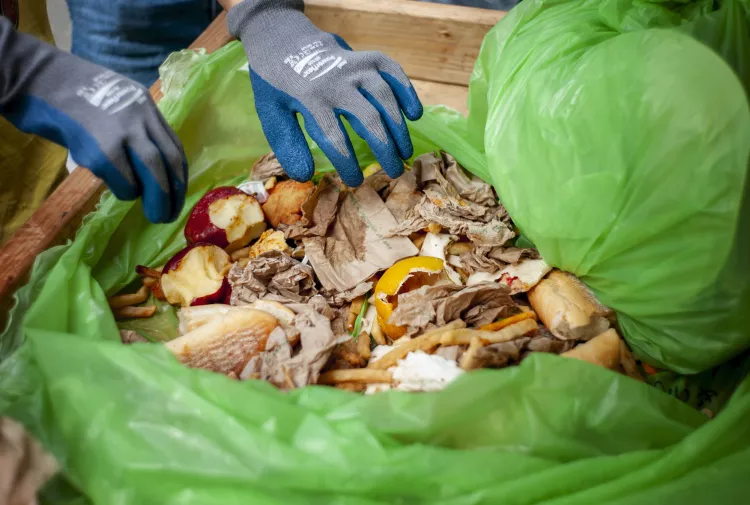- Contact Our Zero Waste Team
Have more questions? Please feel free to email the Zero Waste Working Group at zerowaste@swarthmore.edu.
- Managing Your Waste

Each of us contributes to waste that is generated on Swarthmore’s campus, and we can all play a role in being better neighbors and environmental stewards. Below is a list of categories of items that fall into each of our waste streams.
Compost
- All single-use plates, cold cups and hot cups (with lids), straws, and wooden utensils from Swarthmore Dining locations and Swarthmore Catering are compostable. Items labeled GREENWARE, ECO, ECOCONTAINER, Nature’s Plastic, and PLA #7 are compostable and should be placed in one of the green compost bins located throughout campus.
- All food waste and paper napkins from the Dining Center, Essie’s Corner, Science Center, and Kohlberg Cafe are compostable. Please remove items such as plastic tea packets, chip bags, condiment packets, plastic wraps, or other trash before disposing of your meal.
- Paper towels from the bathrooms are collected for composting in all academic and administrative buildings. Please place menstrual products in the white or metal menstural hygine waste receptacles and put all other waste items in the nearest tri-bin system outside.
- Outdoor waste bins are not designed to collect compostable items. Please take compostable items indoors to a tri-waste bin system and sort them accordingly.
Recycling
- Only plastic containers with numbers 1, 2, and 5 are recyclable. If the container is without a number or numbered 3, 4, or 6, it should be placed in the trash waste stream.
- White or clear plastic containers are recyclable; please dispose of food waste and utensils in the compost before recycling.
- Black plastic containers are not recyclable; they are trash.
- For electronic waste, please drop off batteries or printer cartridges at the collection site in Shane Lounge in Parrish Hall. You can now use the West Fieldhouse Lane Parking collection bin behind Print Services to dispose of your small electronic waste items. Please email workbox@swarthmore.edu for larger electronic waste disposal.
Trash
- Black plastic and other items that are not recyclable or compostable should be placed in the trash waste stream. All menstrual products should be placed in white or metal menstrual hygiene waste receptacles.
If you have questions about whether to place an item in compost, recycling, or trash, please refer to our Waste Disposal Guide or the waste signs posted at waste bins throughout campus.
If you are planning an event and would like to explore best practice guidelines for reduction and diversion, check out the Green Events Guide created in partnership with our Events Management office.
If you are planning a giveaway, check out our Green Giveaway Guide. This guide can serve as a starting point for you to make a sustainable choice when purchasing and giving away items.
- Waste Characterization Studies

A compost bag being sorted for contamination during a Waste Characterization Study.
Each fall, the Zero Waste Working Group hosts a campus event, the Annual Waste Characterization Study, to sample waste data from buildings across campus. Bags of compost, recycling, and trash are collected from around a half-dozen buildings. First we track, by weight, how much was placed in each of those waste streams. Then we resort materials in each stream to determine if they were placed in the correct category (e.g., were there compostables in the trash stream?). By collecting these data and comparing across years, we can approximately determine our progress in diverting material away from trash incineration.
Members of the Zero Waste Working Group, Green Advisors, and other Office of Sustainability interns also regularly conduct waste characterization studies for individual buildings at their request.
Waste Characterization Studies are designed to track diversion metrics, but are not conducive to tracking reduction. The Zero Waste Working Group is working with various haulers and processing facilities for our compost, recycling, and trash in order to improve tracking of our total waste amounts over time.
You can read the following Waste Characterization Study reports below.
- Zero Waste Plans
The College’s Zero Waste Working Group leads the College’s operational and educational efforts to achieve our waste targets. In the 2016-2017 academic year, the Zero Waste Working Group commissioned an initial report to summarize the status of campus integrated waste management.
In June 2022, Swarthmore College formally adopted the 2022 Zero Waste Plan, which establishes new goals for becoming a zero waste campus by 2035. The plan lays out strategies and priorities, summarized in the Executive Summary , for achieving these goals by cultivating a culture of zero waste on campus, reducing our per capita waste consumption, and diverting as much recycling and compost away from our trash as possible.
Zero Waste

Swarthmore has committed to becoming a Zero Waste campus in our efforts to reduce environmental harm and promote just and sustainable systems.
Since 2016, we have undertaken a substantial effort to reduce the waste that we generate and to divert waste away from incineration in Chester, PA and into compost or recycling. We have also built a fully campus-wide, “post-consumer” compost system that offers compost bins in every campus building, managed by our Environmental Services team and the student Green Advisors. Read on below and in the linked pages for more information about our baseline metrics, quantifiable goals, and community practices.



